At first they traveled west: on foot and in the beds of pickup trucks, “borrowing” clothes from clotheslines along the way, and food from unharvested fields. Once they hit the Mississippi River, they followed it north. Winston could feel himself being drawn upriver, the way salmon were drawn against a powerful current.
Winston knew they were moving toward Others like themselves—it was something he had sensed from the beginning—but where would they find them and how long would it take?
And where to go now?
As he stood at the edge of western Kentucky’s woods, he looked out across the swirling waters where the Ohio and the Mississippi met—a delta that divided three different states. Where to go from here? Kentucky, Illinois or Missouri. Decisions were getting harder and harder for Winston these days. The very thought of having to make one made him want to put his thumb deep in his mouth and suck on it to make all his problems go away. He’d been getting that thumb-sucking urge a lot lately—like he used to the first time he was little. But he reminded himself that he was fifteen and forced the urge away. Instead he focused his attention on that piece of turquoise cloth in his other hand, studying the soothing richness of its color. There was something important about that color—he was certain of it.
In a few minutes he returned to their campsite and slipped into his sleeping bag, which was just an old comforter he had found in a Memphis Dumpster.
“Did you hear what I said about Omaha?” Tory asked. “About that astronomer? He’s supposed to be a kook, but then maybe only a kook will talk to us.”
Winston rolled over, away from her. “Sure,” he said. “Whatever.”
Tory sighed. “It would help,” she said, “if you did some of the thinking around here.
Winston slid deeper into his sleeping bag. “Thinkin’ just makes me angry. I got no use for it anymore.”
“You know,” said Tory, “you’re not an easy person to run away with.”
Winston rolled over to face her. “Just because we ran away at the same time, in the same direction, doesn’t mean I ran away with you.” But even as he said it, Winston knew he was wrong. They were stuck with each other—and even if they were to go their separate ways, he knew they’d end up bumping right back into each other—pulled together like two magnets.
Winston began to think of his family. The faces of his mother and brother were getting harder to remember.
“My Mama’s probably turnin’ the county upside down lookin’ for me.”
“I thought you called her and told her you were all right.”
“I did,” said Winston. “But she had more questions than I could answer, so I hung right up.”
Tory sighed and slipped deeper into her makeshift sleeping bag. “You’re lucky you got a mama who cares enough to ask questions. My mama’s gone.”
“She’s dead?”
“No, just gone,” said Tory. “Up and left last year. I got stuck with my aunt.”
“I m sorry.”
“Just as well. My mama and I never got along anyway. She used to say ‘Tory, your bulb is so dim, you’ll never amount to anything.’ Truth is, I get straight A’s in school. But that didn’t matter. I coulda been a national scholar, she still would have figured me dumber than a doorpost. Anyway, when I started getting this skin problem, my mother just gave up. She said it was my fault all her boyfriends ran away—and I hoped she was right; I would have been ugly just to spite her. When she got drunk she would tell me things like how because of my face, I’d spend my whole life alone and unhappy.”
“Like her?”
“Like her.”
“Sounds like she got on the inside what you got on the outside,” said Winston. “I’d rather be you than her.”
“I’d rather be neither of us,” said Tory. “I’d rather be a prom queen from the right family instead of a . . . a gargoyle.”
“You ain’t no gargoyle,” said Winston. “Gargoyles got big red eyes and ugly teeth, and skin like snakes.”
“I am so a gargoyle. I smell like one—my skin peels like one. One of these days my face’ll probably start turning green too.” Winston looked at her battle-scarred face, and she looked away, not wanting him to look at it anymore.
“You Baptists got a prayer for ugly people?” she asked.
“We got a prayer for everything,” said Winston. But try as he might, he couldn’t think of a prayer for the ugly.
***
Two hundred miles away, Indianapolis was pelted by heavy rain—but the rain that was falling inside Michael “Lips” Lipranski’s soul seemed even worse than the rain outside. The storm raging inside him was full of acid rain, and it burned, filling him with the familiar feeling he could never make go away. He couldn’t talk about that, could he? There are some things you don’t talk about, he thought, as he lay uncomfortably in the van, which was parked in a back alley. There are some things that are just too secret, too personal, so you just never talk about them. Ever.
The trip from Montauk had been torture. The drenched roads all seemed the same—back roads mostly, because they knew they’d be harder to find if they traveled the back roads. Right now, Michael couldn’t bear the thought of another road.
Beside him, Lourdes babbled on about a dream she had the night before, about a gray rainbow—whatever that meant. She was cramped and uncomfortable—none of the van’s seats were wide enough for her. When she finally realized that Michael wasn’t listening, she turned to him and asked, “How do you feel?”
“You know how I feel,” said Michael, adjusting his uncomfortably tight pants. “I feel like I always feel.”
“You know, you’re not the only guy to feel horny all the time,” Lourdes said.
Michael shifted uneasily. “Yes I am,” he answered. “I’m the only one who feels it this bad. The only one in the world.”
“Maybe not.”
“Yeah, sure. And maybe you’re not really fat—you just wear the wrong clothes.”
Michael regarded the ceiling of the van above him, listening to the clattering of the rain.
“I got a brother,” said Lourdes, “who always had girls on the brain, too.”
Michael let out a bitter laugh. If girls on the brain were his problem, then there were thousands of them in there, all with jackhammers.
“Whenever he got the girl crazies,” continued Lourdes, “he’d go off into the bathroom. When he came out a few minutes later, he didn’t feel that way no more. He thought we didn’t know what he was up to, but we did. We just didn’t say.”
Michael cleared his throat. He just kept looking up at the spots in the roof-lining.
“I do that, too,” said Michael. “I do it a lot.” Hearing the words come out of his mouth made tears come to his eyes—but Lourdes didn’t laugh at him. She just listened.
“My brother—I’ll bet he thought he was the only person in the world to do that. I’ll bet he hated himself for it.”
Michael felt his whole body react to his tears. His throat closed up, his feet felt even colder, his fingers felt weak. Above him, the clattering sound of the rain grew stronger.
“Sometimes . . .” said Michael. “Sometimes I think . . . what if all my dead relatives are watching me? What if their ghosts can see the things I do?”
“Dead people don’t care,” said Lourdes. “Because if they really do hang around after they die, I’ll bet they’ve seen so many secret things, nothing bothers them anymore.”
“You think so?”
“At the very worst, they think it’s funny.”
“I don’t think it’s funny!”
“That’s because you’re not dead.”
Читать дальше
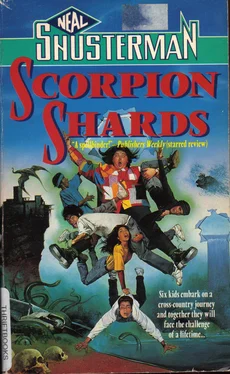
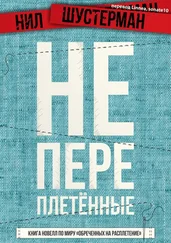

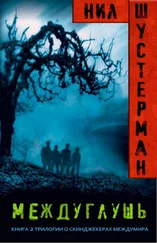

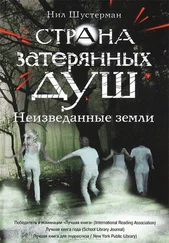
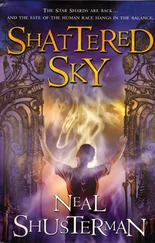
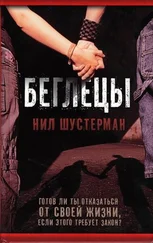
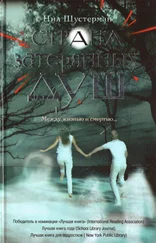



![Нил Шустерман - Жнец [litres]](/books/418707/nil-shusterman-zhnec-litres-thumb.webp)